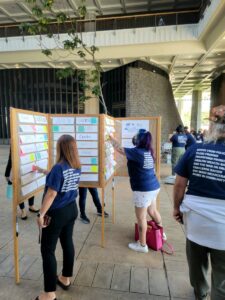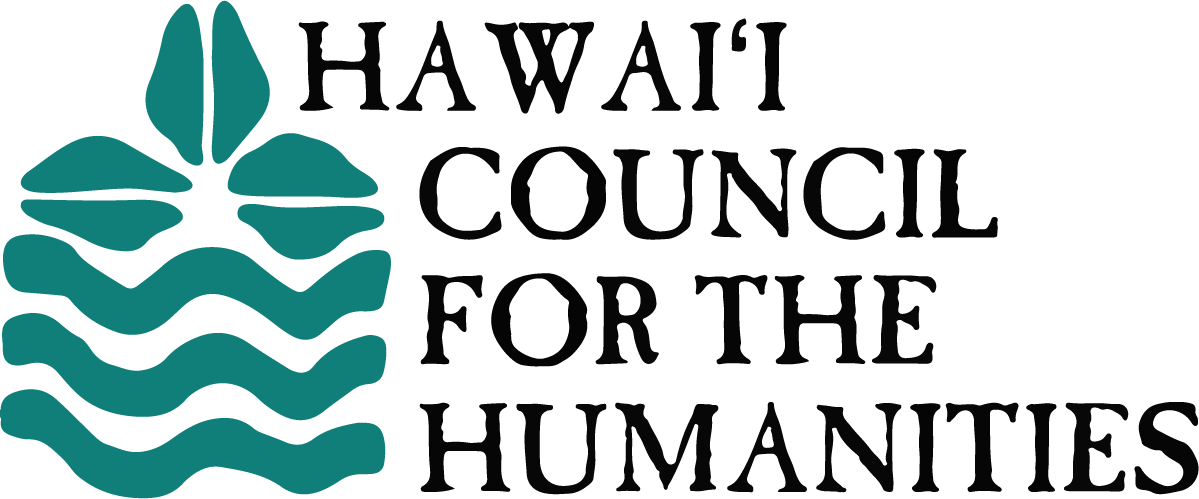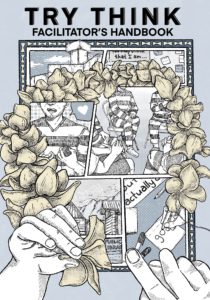UPDATE: Due to sudden federal funding cuts, Try Think has been discontinued as an HCH program. The Try Think program within correctional facilities is continuing as an independent initiative, Try Think Hawai’i, led by Rob Chang. To learn more, participate as a community guest, or support Try Think Hawaiʻi, contact Rob at TryThinkHawaii@gmail.com . Below is the story of Try Think until mid-2025, and we look forward to supporting Try Think Hawaiʻi’s growth and success!
Genuine Conversation Builds Community
The pewa is a traditional woodworking technique used to repair holes or to prevent wood from splitting. Named after the fishtail shape it resembles, the simple and effective pewa embodies the approach of HCH’s Try Think program: gathering together with people we might not normally get the chance to interact with and led by a trained facilitator, participants embraced big topics in a way that enabled all voices to be heard and considered. Whether a public gathering on Kaua’i (Try Think Community Events) or at a correctional facility in Halawa (Try Think Inside), we built connections across divides, experienced healing, and remembered our shared humanity.
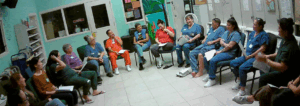
Try Think Inside
In Hawaiʻi, thousands of our community members are incarcerated each year – some for short periods, many for years and decades. The return to community can be difficult for many reasons, one of which is that many have been disconnected not just from society, but from their own sense of purpose, value, and relationships.
Try Think Inside is one way of restoring that connection. Rooted in the humanities, we have created safe and stimulating spaces for deep sharing, listening, reflection, growth, and connection across different voices, and across the Wall separating those inside correctional institutions and those outside in the community. The goals are empathy, human connection and community, and the reduction of public stigma against those with criminal records. The success of those returning to community leads to individuals, families, and communities of resilience and wholeness.
Read: “Try Think Returns to Halawa Correctional Facility and Women’s Community Correctional Center after COVID” (2021), by Rob Chang.
Sessions
Try Think Inside hosts weekly conversation sessions at:
WCCC (Women’s Community Correctional Center): Hawaiʻi’s only women’s facility, serving women from across the islands, Monday evenings 6 pm - 8 pm
Hālawa Correctional Facility: Medium and high-security facility for men, including those serving longer terms, Tuesday evenings 6 pm - 8 pm
Waiawa Correctional Facility: Minimum security facility with many residents preparing to transition back into the community, Wednesday evenings, 6 pm - 8 pm
Each session brings together residents and invited guests—artists, cultural practitioners, teachers, farmers, bankers, and other members of the community —to share space and dialogue. For many guests, it’s their first time inside a correctional facility, and their first time talking story with someone incarcerated.
Interested in participating as a community guest? Contact Rob Chang of Try Think Hawai’i at trythinkhawaii@gmail.com .
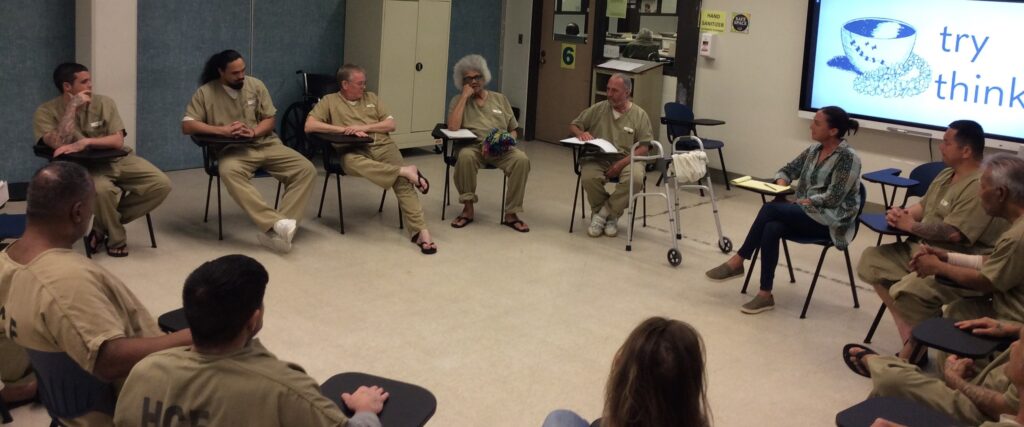
Guiding Principles
The approach influences the response. In contrast to instruction or presentation, facilitation as an approach allows for shared responsibility among facilitator and participant in fostering conversation. Facilitated conversation can break power hierarchies and expectations, and prioritize our full human selves.
Below are some of the principles that guide our conversations:
1) Everyone matters; not everyone feels they matter.
Residents often share how they feel they are perceived as “trash.” Living out that everyone matters impels us to be aware of and more accepting of differences by creating a space that is safe physically, emotionally, and intellectually for all.
2) “Everything is truth. Nothing is watered down.”
A resident shared this at a recent session to describe how the facilitators don’t lie or avoid saying something unpopular. This applies to the whole group as well, as participants are encouraged to bring and advocate for their full selves, expressed in diverse ways.
3) Acknowledge conflict and channel it productively.
Within a prison, conflict can be handled with raised voices, shutting out, punishment, or violence. Productive channeling means that people emotionally connect to the discussion in a meaningful way, not necessarily happily, but feeling heard and considered. Someone may say something untrue or hateful that is part of their truth; the responsibility is on the group not simply to roll their eyes and ignore, but to respectfully push back, such as by asking questions or sharing their own stories. This helps build coping skills to empower those returning to negative environments.
4) We are all co-learners.
While not an instructor, facilitators can embody a leadership role, such as by stepping in when guidance is needed. Community guests and members join as co-participants, curious, humble, and willing to learn and fail.
Learn more about the insights and experience behind the Try Think approach to facilitation in the Try Think Facilitator’s Handbook (2021) (pdf).
Watch “ʻIke Kaiāulu Talk Story Nurturing Collaborative Work: How do we ENGAGE with our Communities? Try Think.” with Rob Chang (2021).
Try Think Inside – Community Gatherings
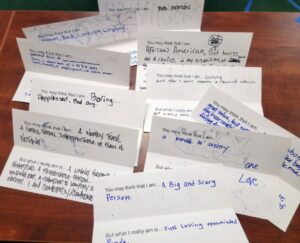
In 2025, Try Think initiated 3 gatherings in the community to bring together those with lived experience and community members. Although federal funding cuts curtailed 2 of the events, Try Think partnered with the East Hawaiʻi Cultural Center on Hawaiʻi Island to include an interactive activity as part of EHCC’s exhibition, “Inside: Incarcerated Voices of Hawaiʻi and Beyond” (flyer).
In an activity organized by then Try Think Program Director Rob Chang, Try Think facility residents each created a folded card that featured their first names or how they’d like to be called, and then completed two sentences, “You may think that I am …” and “But what I really am is ….” Visitors to the exhibition read the cards and were invited to write short responses.
In explaining her approach, EHCC Exhibit Curator Kanani Daley shared, “As a curator, the idea of an exhibition living beyond the gallery walls through the work and actions of an inspired community makes curatorial work meaningful. This is why I do the work, to bring voices from the periphery into the focal plane, and activate a creative and compassionate community.
“The impact of Try Think went beyond my expectations. The 173 expressive, honest, and emotive hand-written messages were visually impactful, while visitors reported feeling deeply moved and inspired with compassion after reading the messages in the cards. Many visitors stayed in the gallery for an hour or more contemplating on what they saw and felt, and more than 100 visitors wrote back to the Try Think participants,” she wrote.
Rob shared about the Try Think Inside program and the activity at the exhibition’s opening event on May 30th, and facilitated a community conversation at the closing of the exhibit, on June 28th. The conversation question the latter group decided upon was, “How do we talk about incarceration with children?”
Staff
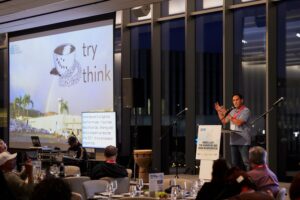
ROBERT CHANG
A 1997 graduate of UH Mānoa with a degree in Hawaiian Studies, Try Think Director Robert Chang joined HCH in 1999 to spearhead Motherread, a national program that trained parents in how to read and discuss books with their children, across the state, including as HCH’s first humanities program in correctional facilities. He developed the Try Think model with Dr. Tammy Jones and launched it at WCCC in 2017, followed by Hālawa and Waiawa Correctional Facilities. He and HCH staff initiated Try Think public programming in 2019. He co-developed the Facilitator’s Handbook in 2021, and has presented on this work at numerous local and national conventions and gatherings. In late 2024, Rob served on the planning committee and as a forum speaker for Inside & Out: The Humanities and Mass Incarceration national convening attended by 24 state humanities councils and their community partners. (Read more about the convening here, including Reflections and Resources.) He has facilitated Try Think community conversations, both online and in person, on a variety of topics. During the COVID-19 pandemic, Rob also became HCH’s Deputy Director to help the council stabilize and support connection through crisis.
DR. TAMMY JONES
Tammy joined the Try Think staff as the Reading & Discussion Program Assistant in 2017. Her PhD in Curriculum Studies and experience teaching in both public and charter schools on Oʻahu helped to create a deep foundation for the the design and launch of Try Think in the correctional facilities in 2018. Her contributions include co-developing the Try Think Facilitator’s Handbook and each session’s curriculum. As a Try Think Co-Facilitator with Rob at the Hālawa Correctional Facility, Tammy has brought music, poetry, comedy, film, art, and more into the circle. She creates a safe space for each participant to show up in all our honesty and contradictions through her “Jersey Girl” strength, humor, and vulnerability.
BRANDY CHANG
Brandy Chang, a Hawaiʻi public high school teacher for over 15 years, has served as a Try Think Facilitator at the Women’s Community Correctional Center since 2019. She is a believer in humanity, a practitioner of inclusivity and an advocate for making education accessible for everyone. Her superpowers include being a public high school teacher, Micronesian Club advisor, and full-time mom. Anyone who has sat in one of Brandy’s circles has benefited from the healing strength of her wisdom, humor, and compassion.
2024 Impact
In 2024, Try Think provided a total of: - 48 sessions at Halawa, average participants/session: 26 - 30 sessions at WCCC, average participants/session: 10 - 7 sessions at Waiawa (started in Nov. 2024), average participants/session: 11 - 55 visits by 27 community guests. Voices from Our Community: Roseanne Propato, Corrections Education Supervisor: “I hear them say, ‘I love coming to this class because I feel like I’m normal, I feel like I’m not here [in prison].’ This program helps incarcerated individuals see that they are still a part of the community, that people do want to welcome them back. Sometimes that can be hard for them to believe.” From a Hālawa resident: “I’m here for lying, cheating, doing bad stuff. Hearing community guests comment about how honest and open and vulnerable we are in this class reminds me that that is who I am, truly. It makes me want to be that person more. From a community guest: “I was struck by what [WCCC residents] were saying about being a citizen inside the facility vs. outside the facility, and about power. It makes me wonder about my responsibilities as a citizen on the ‘outside’ to hold elected officials accountable to our communities on the inside.
